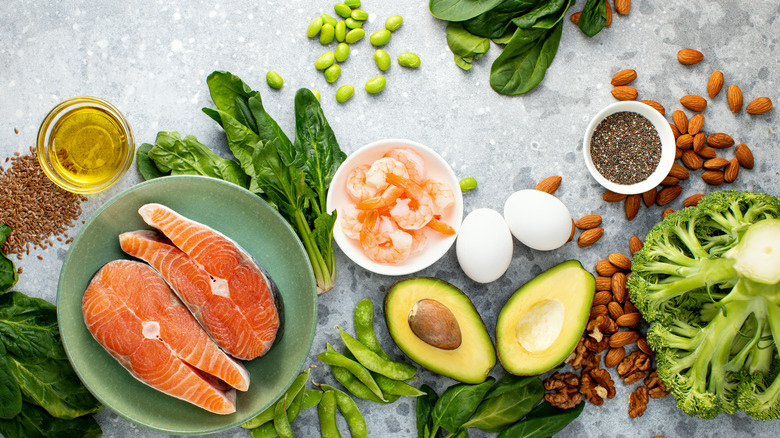Study Reveals Surprising Comparisons Between Plant-Based And Animal Proteins
When it comes to eating protein, the type you eat may not be as important as you think. According to a study released on June 22, 2022 published in the Journal of Agricultural and Food Chemistry, sources of protein from animals and plant-based options provide your body with a similar amount of absorption of vital protein. In fact, the difference in how much protein was absorbed by the body when consuming animal protein compared to plant-based protein was only 2%, with animal products being slightly better absorbed. Healthline reports that researchers weren't surprised by the results because they are consistent with the findings of previous studies.
Since it generally takes up to four hours for food to move through the small intestine after being consumed, the researchers analyzed how well peptides moved through the gut at intervals of one, two, and four hours. By the four-hour mark, 23% of peptides from the animal protein had passed through the gut cells, in comparison with 21% of the peptides from the plant-based protein.
As long as you're consuming the recommended amount of daily protein, which is generally calculated by 0.36 multiplied by your weight in pounds, both animal and plant-based options are beneficial sources for protein absorption. UCLA Health reports that eating a variety of plant-based protein options can provide your body with all of the essential amino acids it needs to thrive.
Benefits of plant-based protein
In recent years, plant-based protein sources and alternative plant-based meat options have been found to have a plethora of health benefits in comparison with animal products. According to UCLA Health, the American Heart Association has reported that eating less meat can reduce your risk of conditions like cardiovascular disease, high cholesterol, obesity, hypertension, diabetes, and several cancers. Plant-based diets have also been found to decrease inflammation over time.
When it comes to weight loss, plant-based diets show promise, alongside healthy fats and plenty of fiber. A 2017 study published in the Journal of Geriatric Cardiology found that not only did a plant-based diet reduce rates of obesity, but it also lessened future weight gain.
You don't have to completely take meat out of your diet to enjoy the benefits of plant-based protein, says UCLA Health. It isn't an all-or-nothing way of eating, but slowly adding plant-based protein into your diet can lead to health improvements. If you want to try switching out animal protein for plant-based options, start with foods that are firm and have textures similar to meat, such as legumes or tofu.
Beans, legumes, and tofu are plant-based options packed with both protein and fiber, which will help you feel full longer. Other plant-based protein options include nuts, seeds, lentils, and grains like quinoa, oats, barley, and farro.


